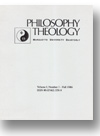|
articles |
|
1.
|
Philosophy and Theology:
Volume >
1 >
Issue: 3
David McLellan
The Marxist Critique of Religion and the Concept of Alienation
abstract |
view |
rights & permissions
| cited by
In the following pages I distinguish three types of Marxism and try to determine which offers the best prospects for dialogue with Christian believers. The first, based on the ontological theses of dialectical materialism, dismisses religion as simply false. The second, reading Marxism as a simple science of society, claims to be value neutral and, as such, indifferent with regard to religion. The third, of neo-Hegelian provenance, addresses itself to many of the questions posed by progressive Christians. Although no ultimate compatibility between Christianity and Marxism is envisaged, the bulk of the article argues for this third interpretation of Marxism as (a) being more emancipatory in itself and (b) permitting a more fruitful dialogue with Christianity - which dialogue is seen as desirable in the face of a reactionary politics which claims support in the Judaeo-Christian tradition.
|
|
|
|
|
2.
|
Philosophy and Theology:
Volume >
1 >
Issue: 3
Bernard Cooke
Prophetic Experience as Revelation
abstract |
view |
rights & permissions
| cited by
To attempt in two short articles to provide an adequate review of present-day reflection about divine revelation to humans is folly; in addition to suggest and justify a particular understanding of revelation borders on the impossible. What I propose to do is something much more limited: within the content of contemporary discussion about revelation to examine only two critical and, I hope, illumining instances - namely, the revelation of the divine that occurs in prophetic experience (which I will deal with here) and (in the sequel) human history as the symbolic agency through which revelation occurs.
|
|
|
|
|
3.
|
Philosophy and Theology:
Volume >
1 >
Issue: 3
Daniel Liderbach
The Eucharistic Symbols of the Presence of the Lord
abstract |
view |
rights & permissions
| cited by
The forms of bread and wine can be understood to be amogs a series of symbols representing the presence of the Lord. The object of the celebration is this presence, not the symbols. This can be observed in the history of the Christian tradition.
|
|
|
|
|
4.
|
Philosophy and Theology:
Volume >
1 >
Issue: 3
Michael Downey
A Costly Loss of Heart:
The Scholastic Notion of Voluntas Ut Natura
abstract |
view |
rights & permissions
| cited by
In using the term “heart” to describe that which is constitutive of human personhood, Jean Vanier gives evidence that he views the person largely as affective, open to attraction, to be acted upon by another and drawn to communion. This is not to suggest that the heart is irrational or anti-intellectual, or to suggest that Vanier’s vision of the human person is so. Rather it is to suggest that, for Vanier, all that is known and decided is to be shaped by the affective basis within the human person which needs to be touched by the Spirit. Maintaining the importance of intellect and reason, especially as these bear upon the social order, Vanier’s concern is with the core or ground of the human person which is antecedent to intellectual activity or rational discourse, and which, when touched by the presence of the Spirit, motivates one to the activity of the beatitudes. Those who respond to this action of the Spirit, and act from the heart when moved by God to compassion, become signs of God’s love, healing, tenderness and compassion.
|
|
|
|
|
5.
|
Philosophy and Theology:
Volume >
1 >
Issue: 3
Sylvain Zac
Life in the Philosophy of Spinoza
abstract |
view |
rights & permissions
| cited by
The notion of life is here presented as a major theme which permeates all of Spinoza’s writings, from the earliest work to the mature statement of his philosophy in the Ethics. Some of the implications of this concept are here outlined, and a number of possible objections to my dynamic interpretation of the concept of life are also explicitated and answered. This artide is a translation of the essay, “Sur une idée directrice de la philosophie de Spinoza,” from Sylvain Zac, Etudes spinozistes, ©1985, Librairie Philosophique J. Vrin.
|
|
|
|
|
6.
|
Philosophy and Theology:
Volume >
1 >
Issue: 3
George H. Tavard
Justification:
The Dilemma of the Sixteenth Century
abstract |
view |
rights & permissions
| cited by
This article and its sequel illustrate the thesis that oblivion of the doctrine of justification and liturgical-eucharistic decadence went together in the middle ages. The ensuing contradictions led directly to the Reformation. Luther recovered the doctrine of justification as he tried to answer the question, how do sinners become just in God’s eyes? But his liturgical reforms were inspired by a medieval theology which made it impossible for him to restore the patristic insight into liturgy and the eucharistic mystery. The council of Trent went a long way toward meeting Luther on justification, but did not attempt to do so in its liturgical reforms, which established the framework for the Counter-Reformation. Thus Catholic and Lutheran differences are based on misunderstandings no less than on different doctrinal stresses.
|
|
|
|
|
7.
|
Philosophy and Theology:
Volume >
1 >
Issue: 3
Andrew Tallon
Editor’s Page
view |
rights & permissions
| cited by
|
|
|
|
